FANS of the 16 clubs watching on during this year's Grand Final will be wondering the same thing: 'when will it be our turn?'.
To help answer that question, AFL.com.au has crunched the numbers to reveal the 'premiership standard', measuring age, experience and gamestyle of the past 10 flag-winning sides.
From Geelong in 2009 to West Coast last season, every premiership squad has fallen within the 23.2 to 24 age bracket and averaged 66.1 games per player.
So what about the way teams need to play?
We're told defence wins flags, and the past 10 premiers have all ranked top six for points conceded and top five for inside 50 differential.
The fairytale Dogs (seventh) bucked the trend in 2016 coming from outside the top five for points from forward half intercepts differential.
Meanwhile, last year's Eagles were way below the standard in post-clearance ground ball, ranking 16th when every other successful side was in the top nine.
So how did your club stack up in 2019, and when could they hit the premiership sweet spot?

How does the age and games played stack up?
The Crows were the second-oldest and third-most experienced list in 2019 and we've already seen Richard Douglas delisted, Andy Otten retire and Sam Jacobs depart to exercise his free agency rights. Eddie Betts and Josh Jenkins have one foot out the door. Cam Ellis-Yolmen, Hugh Greenwood and Alex Keath, who will all be 27 or older by the start of next season, are also exploring their options.
Do they have enough quality?
Champion Data rated six Adelaide players as 'elite' entering the season and that number's been slashed in half by year's end. There is still top-end quality, including Rory Sloane, the Crouch brothers Matt and Brad, Rory Laird, Daniel Talia and Brodie Smith, and a sprinkling of promising youth such as Wayne Milera, Tom Doedee, Darcy Fogarty and Chayce Jones.
MILLION-DOLLAR MAN? Gun Crow seeks huge contract from rival clubs
Matt Crouch, Rory Sloane and Brad Crouch will make sure there's class in the Crows' midfield. Picture: AFL Photos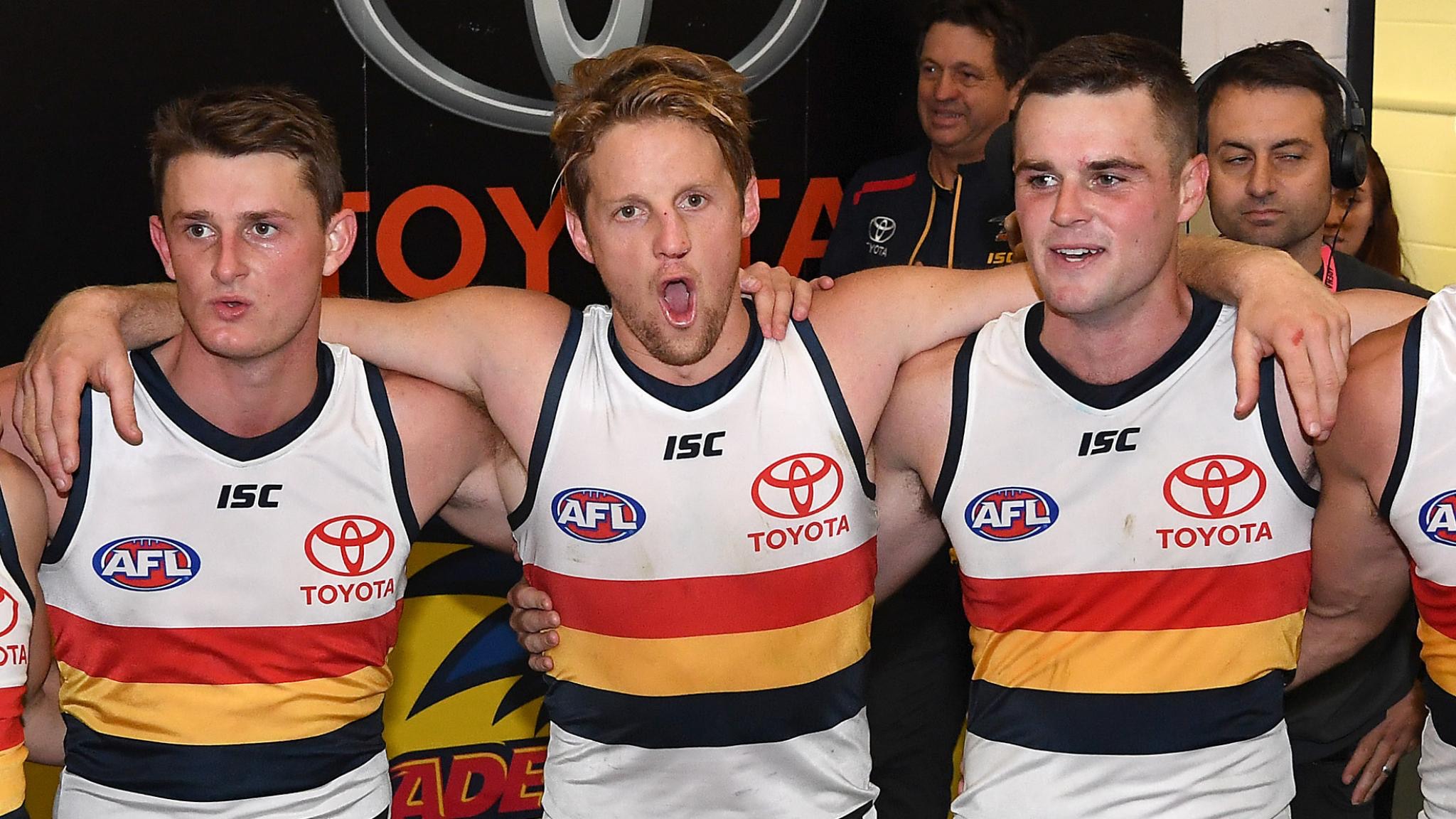
What do the numbers say about the way they play?
One of the Crows' worries is how they ranked in four key categories that premiers from the past decade have typically been prominent in. They conceded the eighth-most points and were lowly in differential for points from forward-half turnovers (12th), inside 50s (13th) and post-clearance groundball-gets (eighth). Adelaide wins a fair bit of the Sherrin but there's little else it was prominent in.
Is their premiership window open?
Slammed shut. The Crows were perennial contenders before struggling the past two seasons. A further step back looms as the list regenerates. – Marc McGowan

How does the age and games played stack up?
The Lions are primed for a premiership assault in 2020, based on the demographics of the premiers from the past 10 seasons. They were already in the sweet spot for average games played per footballer (66.6) but they were the second-youngest list in the AFL this year (22.6 years). Collingwood's 2010 squad, at 23.2 years, was the youngest flag-winner in the last decade.
Do they have enough quality?
Undoubtedly. Brisbane joins Richmond and West Coast with a League-leading seven 'elite' players, according to Champion Data. Harris Andrews, Charlie Cameron and Lachie Neale made this year's All Australian team, while Hugh McCluggage and Dayne Zorko – an All Australian last season – were shortlisted. Then consider the likes of Daniel Rich, Jarryd Lyons, Stefan Martin, Jarrod Berry, Mitch Robinson, Alex Witherden and Eric Hipwood.
What do the numbers say about the way they play?
The Lions played a brand of football this year that mostly fits the premiership profile. They could tighten up down back as far as points conceded (ranked seventh) and climb higher in inside 50 differential (sixth). However, Brisbane was second in differential for post-clearance groundball-gets and fourth for scores from forward-half turnovers. Chris Fagan's men have one of the highest kick-to-handball ratios in the AFL.
Is their premiership window open?
Wide open. The Lions exited the 2019 finals in straight sets, but the losses were to the eventual Grand Finalists. They're young and most of their players are contracted for the long term. – Marc McGowan
How does the age and games played stack up?
The Blues have gotten lots of game time into their young talent. Therefore, while the average age of their squad (22.7 years) is significantly greener than the average age of most of the recent premiership teams (average of 23.6 years over the last decade), their games average (63.4) means they are more experienced than two of the last three premiers.
Patrick Cripps won this year's Leigh Matthews Trophy at the AFLPA awards. Picture: AFL Photos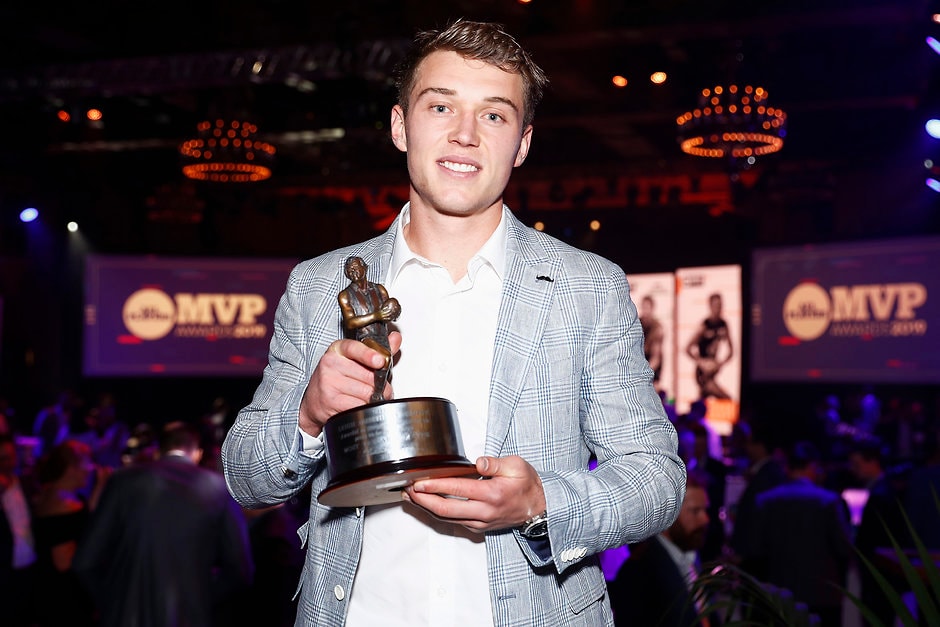
Do they have enough quality?
Not at the moment. Carlton currently only has one player classified by Champion Data as 'elite', though it has rebuilt through the NAB AFL Draft and will be confident that a number of its young talent will be able to eventually get to that point.
What do the numbers say about the way they play?
The Blues are not currently playing at a premiership standard. If you look at the key statistical indicators for flag success over the last decade, the Blues don't rank high in any of them. They drastically need improvement in points against (ranked 15th), post-clearance groundball gets (11th), points from forward-half turnovers (14th) and inside 50 differential (16th).
Is their premiership window open?
It's opening. Give a young and rebuilding Blues side another couple of years. – Riley Beveridge
How does the age and games played stack up?
They are right in the sweet spot, but the clock is ticking. Only two teams – Geelong in 2011 and Hawthorn in 2015 – have won flags over the last decade with an average age the same as Collingwood's is now (24.0 years). Meanwhile, their average games played (88.0) would make them the most experienced premiership team in a long time – and by a fair margin.
Do they have enough quality?
Yes. Only three teams – Richmond, West Coast and Brisbane – have more players classified by Champion Data as 'elite' than Collingwood. It has five players in this bracket, though would like to develop more young talent to eventually bring into this category.
What do the numbers say about the way they play?
Again, Collingwood finds itself in a prime position to strike now. The Pies rank second for points against, while they also rank top-five in the League for other key statistical indicators for premiership teams – including post-clearance groundball gets (second), points from forward-half turnovers (fifth) and inside 50 differential (fifth).
Is their premiership window open?
Yes. But given Collingwood has an ageing squad, it must strike while the iron is hot. – Riley Beveridge
How does the age and games played stack up?
It couldn't get much closer to premiership standard over the last decade. The average age of Essendon's squad (23.4 years) is almost identical to the average age of the last 10 premiers (23.6 years), while its average games played (66.0) is just a tick under the average of the last 10 flag winners (66.1).
Do they have enough quality?
As is the case with almost every side in the League, Essendon could use a little more quality. The Bombers have just three players classified by Champion Data as 'elite' on their list, with six teams across the competition having more.
Will Joe Daniher still be on the Bombers' list in 2020? Picture: AFL Photos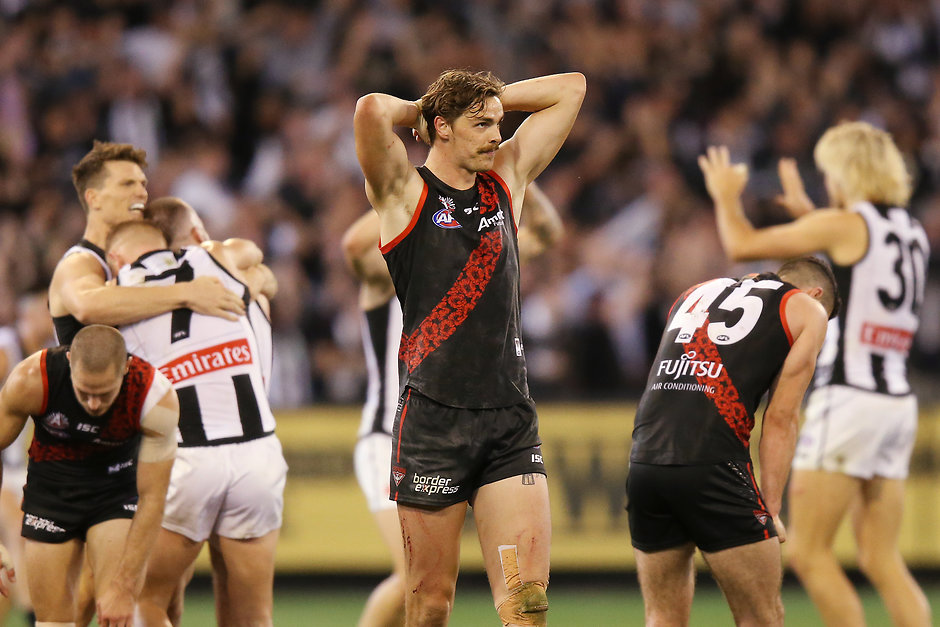
What do the numbers say about the way they play?
This is the worry. For its near-perfect age profile, Essendon ranks incredibly low in a number of key statistical indicators for premiership success over the last decade. It must improve significantly in points against (ranked 12th), post-clearance groundball gets (15th), points from forward-half turnovers (15th) and inside 50 differential (14th).
Is their premiership window open?
Essendon's age profile would say yes, but its ranking in key statistical indicators would say no. The Bombers face an interesting couple of years to see if they can profit from their list position. – Riley Beveridge
How does the age and games played stack up?
Nearing the end of a four-year rebuild, the Dockers are in the bottom four for average age (22.9 years) and should get even younger and less experienced (average 67.6 games) next year when departing veterans Aaron Sandilands and Hayden Ballantyne aren't counted. The time to strike won't be far away with a number of key personnel either in, or close to, their prime years.
Do they have enough quality?
Nat Fyfe and Michael Walters are superstars, and there is plenty of talent amongst the best 25 players. If everything clicked on the injury and form front, Fremantle can certainly return to finals in 2020. Losing Lachie Neale and probably Bradley Hill (not to mention Ed Langdon) in their peak in successive years hurts.
Michael Walters has done it again! He kicks a set shot goal at the death to give the Dockers the win! pic.twitter.com/mp08BjkMrO
— AFL.com.au (@AFLcomau) June 1, 2019
What do the numbers say about the way they play?
With a new coach coming in the Dockers will look different but the groundwork has been laid. The backline and team defence improved sharply this season (AFL No.9 for points conceded), supply (ninth for inside 50s differential) was far from the biggest issue and post-clearance groundball (sixth) was strong. Fremantle wasn't great locking the ball inside attack (13th for points from forward-half turnovers) and was frustratingly inefficient. Improving skills will help.
Is their premiership window open?
Should be opening soon. The Dockers have to make the most of Fyfe and Walters' primes – they are both 29 next year. The new coach will only get a season's grace before expectations rise. – Travis King
How does the age and games played stack up?
The Cats were the fourth most experienced (81.1 games) and equal-fourth oldest (23.5 years) team in 2019 and are in an intriguing phase of their list management after falling short again in a preliminary final. Will veterans Gary Ablett (35) and Harry Taylor (33) go around one more time, and how much do Tom Hawkins and Joel Selwood (both 31) have left in the tank?
Do they have enough quality?
Geelong's five 'elite' players was the equal fourth-most this year, but many of the Cats' stars are their older brigade – Patrick Dangerfield turns 30 next year - and Tim Kelly is expected to request a move back to WA. They have a remarkable ability to stay in contention, but will need to trade and draft shrewdly to go to the next level.
What do the numbers say about the way they play?
The Cats were outstanding in most of the key indicators for premiership success – boasting the stingiest defence, scoring more from front-half turnovers than any side and ranking third at post-clearance groundball. They finished on top of the ladder for a reason.
Is their premiership window open?
It's ajar but closing soon. The clock is ticking with so many guns at the back end of their careers. – Travis King
How does the age and games played stack up?
The challenge the Suns face is well-known, and there's no escaping the fact there is a long road ahead when you consider they are both the youngest (22.4 years average age) and least experienced team in the competition (58.1 games). Gold Coast has targeted experience, and is likely to continue to do so despite missing out on luring Shaun Burgoyne from Hawthorn.
Do they have enough quality?
This year was ground zero for the Suns after losing star co-captains Tom Lynch and Steven May, continuing an exodus of talent since the club's inception – think Harley Bennell, Dion Prestia, Gary Ablett and Jaeger O'Meara to name a few, with Jack Martin and Callum Ah Chee also ready to exit. They currently have no 'elite' players. If they can retain last year's top-10 picks Ben King and Jack Lukosius - alongside re-signed Izak Rankine - it's something to build around.
It took Izak Rankine less than two minutes to kick an incredible goal!#JLTSeries pic.twitter.com/xbVxtdfPDo
— AFL (@AFL) March 3, 2019
What do the numbers say about the way they play?
There's a long way to go for Stuart Dew's men. The Suns ranked last for points conceded (101.5), points from forward half turnovers (-429) and inside 50 differential (-263) in 2019. They were 17th for post-clearance ground balls (-128), albeit miles ahead of West Coast (-259).
Is their premiership window open?
Slammed shut. The Suns haven't played finals in nine seasons and are applying for an assistance package from the AFL Commission. A flag is a distant dream. – Travis King
How does the age and games played stack up?
The Giants are young, but have experience in their favour, which is a good combination. The average age of their squad (23.4 years) is in the prime hitting zone and still remains younger than the average age of the last 10 premiers. But their average games played (75.1) would make them the most experienced flag winners over the last decade.
Do they have enough quality?
The Giants have only three players ranked by Champion Data as 'elite', but with a young list at their disposal you can expect more talent to quickly climb into that category. The team they will play in this weekend's Grand Final, the Tigers, have seven players classed 'elite'.
What do the numbers say about the way they play?
The numbers bode well for a tilt at the premiership. The Giants rank No.1 in the League for post-clearance groundball gets, but they would like improvement in a number of other key statistical indicators for premiership success. Those areas are points against (ranked fifth), points from forward-half turnovers (eighth) and inside 50 differential (11th).
Is their premiership window open?
Yes, and it should stay that way. Expect the Giants to challenge consistently over the next few years. – Riley Beveridge

How does the age and games played stack up?
This was the AFL's oldest (average of 24.1 years) and most experienced list (88.9 games) in 2019. Jarryd Roughead has retired, while decisions are still to be announced on Paul Puopolo, Grant Birchall and Ryan Schoenmakers. The Hawks will stay among the leaders in this measure, given Shaun Burgoyne, James Frawley, Ben McEvoy, Ben Stratton and probably Isaac Smith are playing on.
Generational change: James Worpel congratulates Jarryd Roughead after the veteran's last game. Picture: AFL Photos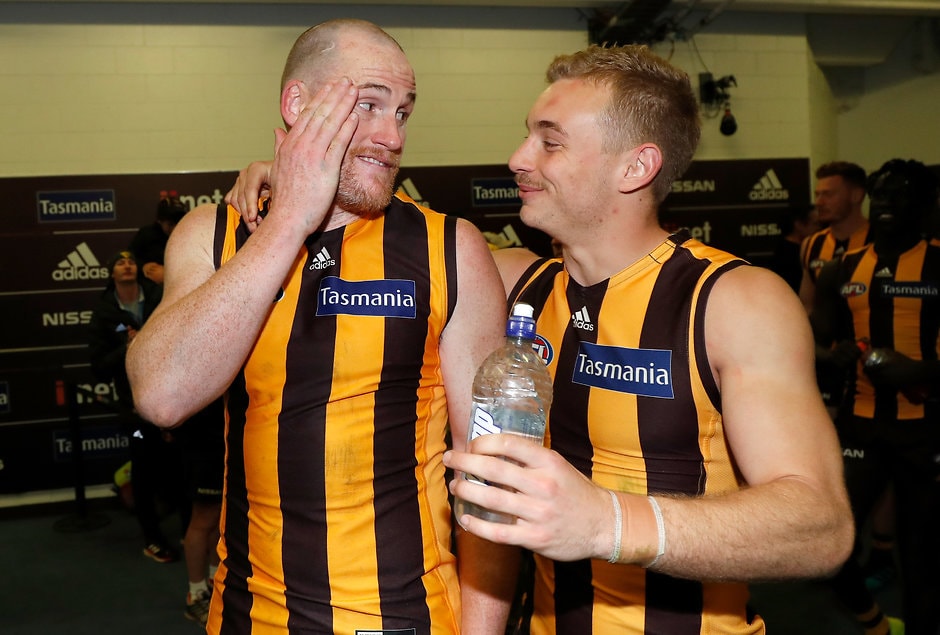
Do they have enough quality?
Four Hawks are considered 'elite'. James Sicily is one of the competition's best rebounding defenders, Henderson was one of the top wingmen this season, James Worpel starred in his second year and McEvoy is among the most prominent ruckmen. Then consider this group: Brownlow medallist Tom Mitchell, Jaeger O'Meara, Jack Gunston, Smith, Frawley, Luke Breust, Chad Wingard, Jarman Impey and Tom Scully.
What do the numbers say about the way they play?
There were offensive shortcomings for the Hawks this season, but they played a style that would stack up in September. Only two clubs conceded fewer points, they were third for points from forward-half turnovers differential, had the fourth-best inside 50 differential and were seventh in post-clearance groundball-gets differential. Hawthorn was also strong in points-from-intercepts differential.
Is their premiership window open?
It's ajar. Finished with six wins in their last eight games, including beating West Coast, GWS, Collingwood and Geelong. Hawthorn will shed some experience but Mitchell will be back. – Marc McGowan
How does the age and games played stack up?
The list demographics suggest the Demons are in the premiership window. This year only three teams were less experienced on average (65.7 games) and just four were younger (23 years). The average premier's numbers from the past decade are 66.1 and 23.6, respectively. Jordan Lewis has retired and Jeff Garlett was delisted, so Melbourne might dip or remain similar in age and experience.
Do they have enough quality?
Just two Demons finished with 'elite' status after four started that way. There is potential for more than just Max Gawn and Clayton Oliver to be placed in this class. Players such as Tom McDonald, Steven May, Jake Lever, Christian Salem, Jake Melksham, Christian Petracca and Angus Brayshaw should be better next season – and must be if Melbourne is to improve.
What do the numbers say about the way they play?
Only Gold Coast was worse in coughing up points and scoring from forward-half turnovers, and the Dees were mid-table in differential for post-clearance groundball-gets and inside 50s. This is a team that openly builds from the contest out, but went from near-record numbers in the clinches a season ago to being a bit better than average in that department in 2019.
Is their premiership window open?
Ajar, and could be opening further. The list demographics and what Melbourne produced in the 2018 finals – despite the dreadful campaign this year – mean there is still some optimism for next season and beyond. – Marc McGowan
How does the age and games played stack up?
What was quite an old and experienced list only a few years ago has undergone a significant facelift and now sits mid-table for average games played (73.7) and age (23.3 years). The Roos re-signed or extended Todd Goldstein, Shaun Higgins and Ben Cunnington this year, but fellow veterans Scott Thompson and Sam Wright retired. On list demographics alone, they are positioned to contend next year.
Do they have enough quality?
This is a common discussion point about the Roos, perhaps unfairly. Champion Data lists North as having three 'elite' players after starting the season with five. Ben Brown, Cunnington, Higgins, Robbie Tarrant, Goldstein and Jared Polec are among the best players in the competition at their position. There is also great hope for Jy Simpkin, Tarryn Thomas and Luke Davies-Uniacke.
North anticipates big things from Tarryn Thomas (left) and Luke Davies-Uniacke. Picture: AFL Photos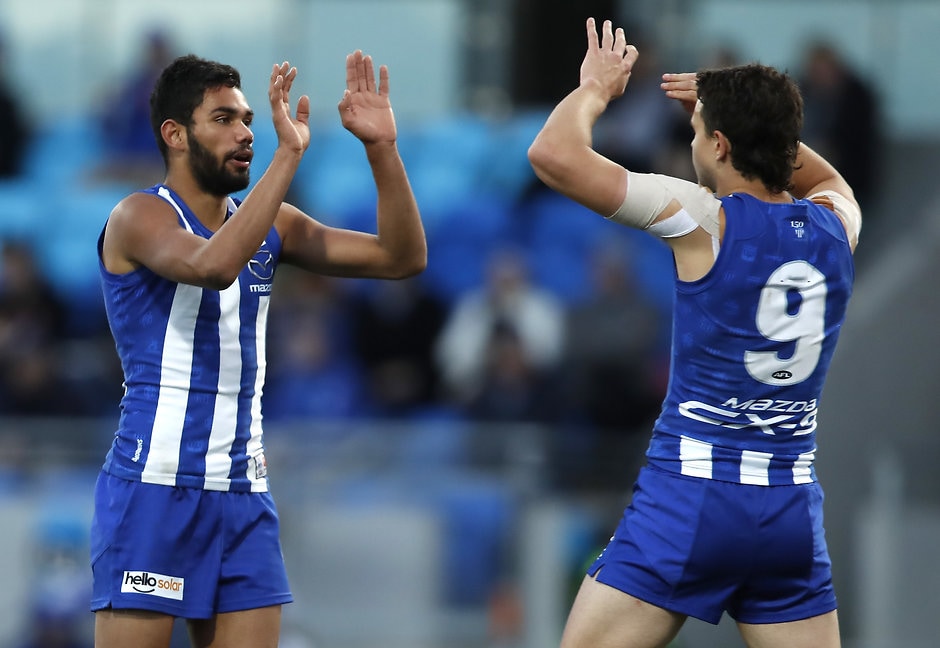
What do the numbers say about the way they play?
North kicks long more often in the Rhyce Shaw era – all 12 games of it – goes through the corridor less and its forward-half game is far better. Overall, the Roos ranked 14th for points conceded (18th under Brad Scott) and 10th for inside 50 differential (14th under Scott). But they were fourth and sixth, respectively, in differentials for post-clearance groundball-gets and points from forward-half turnovers.
Is their premiership window open?
Barely ajar. The list demographics, the Kangaroos' improved performances under Shaw and the mass off-field personnel changes present major intrigue about what's to come. – Marc McGowan
How does the age and games played stack up?
Port Adelaide's list demographic suggests there is a bit of a gap between youth and experience. While the average age of its squad (23.1 years) is relatively young, the average games played within its squad (79.9) is among the most in the competition. It put a lot of time into its youngsters this season, so will be relatively pleased with where it is placed.
Do they have enough quality?
Not necessarily. Port Adelaide has just two players on its list classified by Champion Data as 'elite'. Only three clubs – Carlton, St Kilda and Gold Coast – have fewer. However, its three first-round draft picks from last year – Connor Rozee, Zak Butters and Xavier Duursma – are all capable of one day moving into this bracket.
Can Xavier Duursma shoot into the elite class soon? Picture: AFL Photos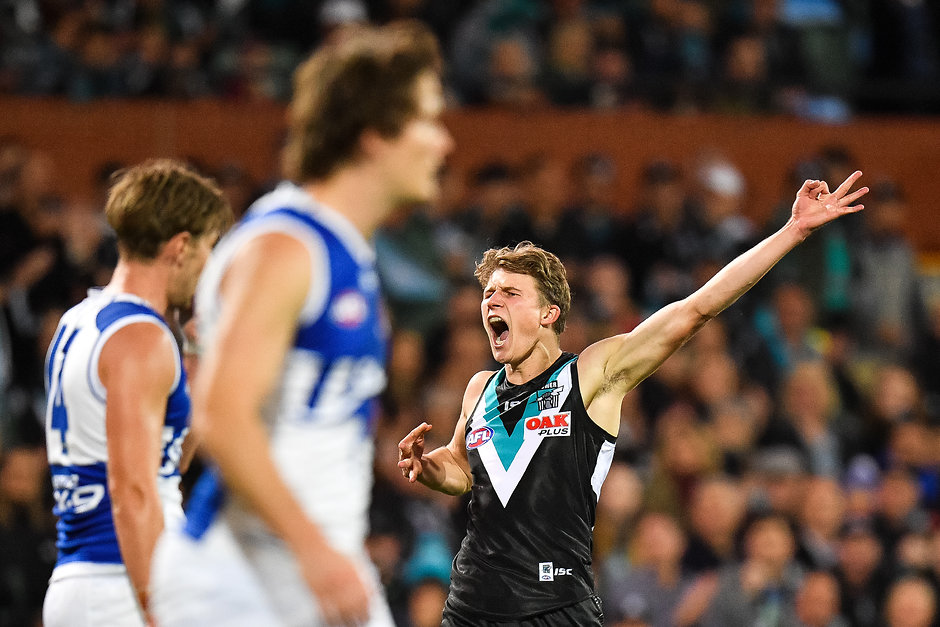
What do the numbers say about the way they play?
They are quite promising, particularly in key statistical indicators for premiership success. Port Adelaide ranks No.1 in the League for inside 50 differential, while it is also improving in points against (ranked eighth), post-clearance groundball gets (14th) and points from forward-half turnovers (ninth).
Is their premiership window open?
Not yet, but it is becoming ajar. Port probably needs a more balanced list before it can challenge. – Riley Beveridge
How does the age and games played stack up?
The Tigers are obviously in premiership mode ahead of their second Grand Final in three years. It is an experienced group, with an average of 79.1 games to their names, and scarily for rivals they are only ranked 10th for average age (23.2 years). It's difficult to see Richmond dropping out of contention anytime soon.
Experienced teammates help young Tigers Sydney Stack and Jack Ross enjoy their first win. Picture: AFL Photos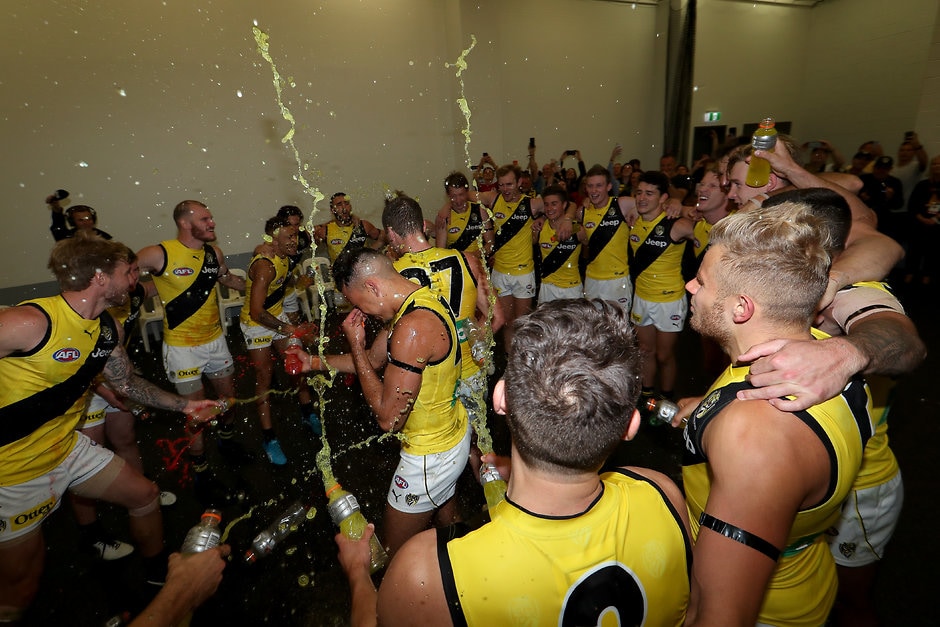
Do they have enough quality?
Absolutely. Seven 'elite' players this year was the equal-most with Brisbane and West Coast, and the Tigers are into another Grand Final despite champion full-back Alex Rance missing basically the entire season. Recruiting and drafting well recently looks likely to extend the successful era.
What do the numbers say about the way they play?
The Tigers tick every 'premiership indicator' box except post-clearance groundball (AFL No.10). They rank top four for points against (No.4), points from forward half turnover (No.2) and inside 50 differential (No.2). Whatever the conditions, their hard-running, forward handball brand stacks up.
Is their premiership window open?
Wide open. The Tigers have been the best team in the League across the past three seasons and should remain thereabouts for some time yet. – Travis King
How does the age and games played stack up?
The Saints are young. The average age of their squad (23.2 years) is younger than any premiership side over the last decade, while their average games played (65.6) is also significantly less than the average experience of the last 10 flag winners.
Vintage Jack Steven!#AFLSaintsFreo pic.twitter.com/jOXowYzJ41
— AFL (@AFL) August 11, 2019
Do they have enough quality?
Not by a long way. St Kilda is one of only two sides, along with Gold Coast, that doesn't have a single player classified by Champion Data as 'elite'. It would suggest that its list still has some way to go before it can challenge. However, having hit the draft hard recently, the Saints will be confident some of their younger players can soon reach that category.
What do the numbers say about the way they play?
Again, they rank low in a number of key statistical indicators for premiership success. These include points against (ranked 16th), post-clearance groundball gets (13th), points from forward-half turnovers (16th) and inside 50 differential (12th). History would suggest successful sides are leading in these areas, so the Saints need drastic improvement.
Is their premiership window open?
No. But with a young list, St Kilda will be hopeful its time can come again soon. – Riley Beveridge
How does the age and games played stack up?
The Swans were the ninth-most experienced side (74.7 games) heading into 2019 but have shed 1048 matches following Jarrad McVeigh, Kieren Jack, Heath Grundy and Nick Smith's retirements. Those departures are set to make Sydney more youthful next year, too, after already being the equal sixth-youngest (23.1 years) this season.
Do they have enough quality?
Only three Swans rated 'elite' this year, and with Lance Franklin turning 33 in January they are targeting Essendon spearhead Joe Daniher. Sydney will need their younger brigade to step up and push the side back towards finals. There is plenty to be excited about as the likes of Isaac Heeney, Callum Mills, Nick Blakey, Will Hayward, Oliver Florent and Tom McCartin develop.
Callum Mills and Nick Blakey represent the future of the Swans. Picture: AFL Photos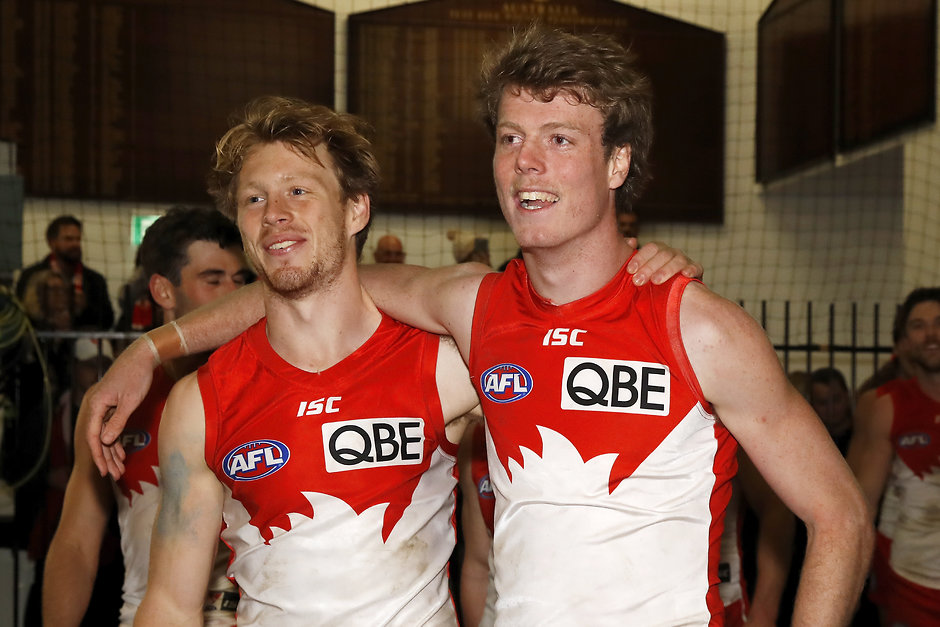
What do the numbers say about the way they play?
They have some work to do. The Swans were in the bottom half of the competition for points against (10th), ground-ball post-clearance (16th), points from forward half turnovers (11th) and inside 50 differential (17th).
Is their premiership window open?
Slightly ajar and could spring open soon. The Swans look to have bottomed out and could bounce quickly with their stack of young talent. – Travis King
How does the age and games played stack up?
The Eagles have been in the flag contention sweet spot, with a mature list (23.5 years average age, equal fourth-oldest) who have played plenty of football together (78.8 games, AFL No.7). The next challenge for Adam Simpson is keeping the team in the premiership mix. Star spearhead Josh Kennedy is fading, Shannon Hurn's body is playing up and Luke Shuey will be 30 next year.
Do they have enough quality?
Seven Eagles were ranked elite by Champion Data this year although, as mentioned above, some are nearing the end of their primes. Bringing Geelong gun Tim Kelly into the mix would help, but they need the next generation like Liam Duggan, Liam Ryan, Tom Barrass, Dom Sheed and Oscar Allen to go to another level to push the team forward.
What do the numbers say about the way they play?
It's no secret the Eagles had some issues getting games on their terms in 2019. They were a long way last in post-clearance ground ball gets, although they also ranked 16th in their premiership campaign. The bigger concerns were drops-offs in inside 50 differential (5th to 15th) and forward-half turnover scores (fourth to 10th). Keeping influential ruck Nic Naitanui on the park would help adjust the territory game.
Nic Nat!
— AFL (@AFL) July 6, 2019
The sublime pick-up sets up Jarrod Cameron.#AFLFreoEagles pic.twitter.com/rfeGqbPkNL
Is their premiership window open?
Open, but needs propping up. It remains to be seen how much Kennedy and Hurn have left in the tank, if Naitanui can stay fit and what the future holds for Willie Rioli. – Travis King
How does the age and games played stack up?
They're more experienced, albeit slightly younger than their 2016 premiership peers. The Dogs rank 11th in terms of average games played (68.8) and ninth for age (23.2 years). Dale Morris, Liam Picken and Tom Boyd all retired this year, so they might be even younger in 2020. No club won a premiership in the past decade with a list younger than what Luke Beveridge had in 2019.
Do they have enough quality?
Absolutely. Only three Bulldogs have 'elite' status with Champion Data, but they're not wanting for talent. Marcus Bontempelli is a superstar, while Jack Macrae and Josh Dunkley joined him in the All Australian squad of 40. Caleb Daniel, Lachie Hunter and Jason Johannisen are other key contributors. Aaron Naughton, Tim English and Bailey Smith are the pick of the kids.
What do the numbers say about the way they play?
Beveridge's men play on more than any other team, love to handball and made serious inroads in their offensive game in the latter stages of the season. They ranked third for inside 50 differential and seventh for points from forward-half turnovers. There's still work to be done in limiting opposition scores and the Dogs were just 12th in post-clearance groundball-gets differential.
Is their premiership window open?
Wide open. There is still the Trade Period to come but most industry pundits are bullish about what Bontempelli and his merry men can achieve. – Marc McGowan


